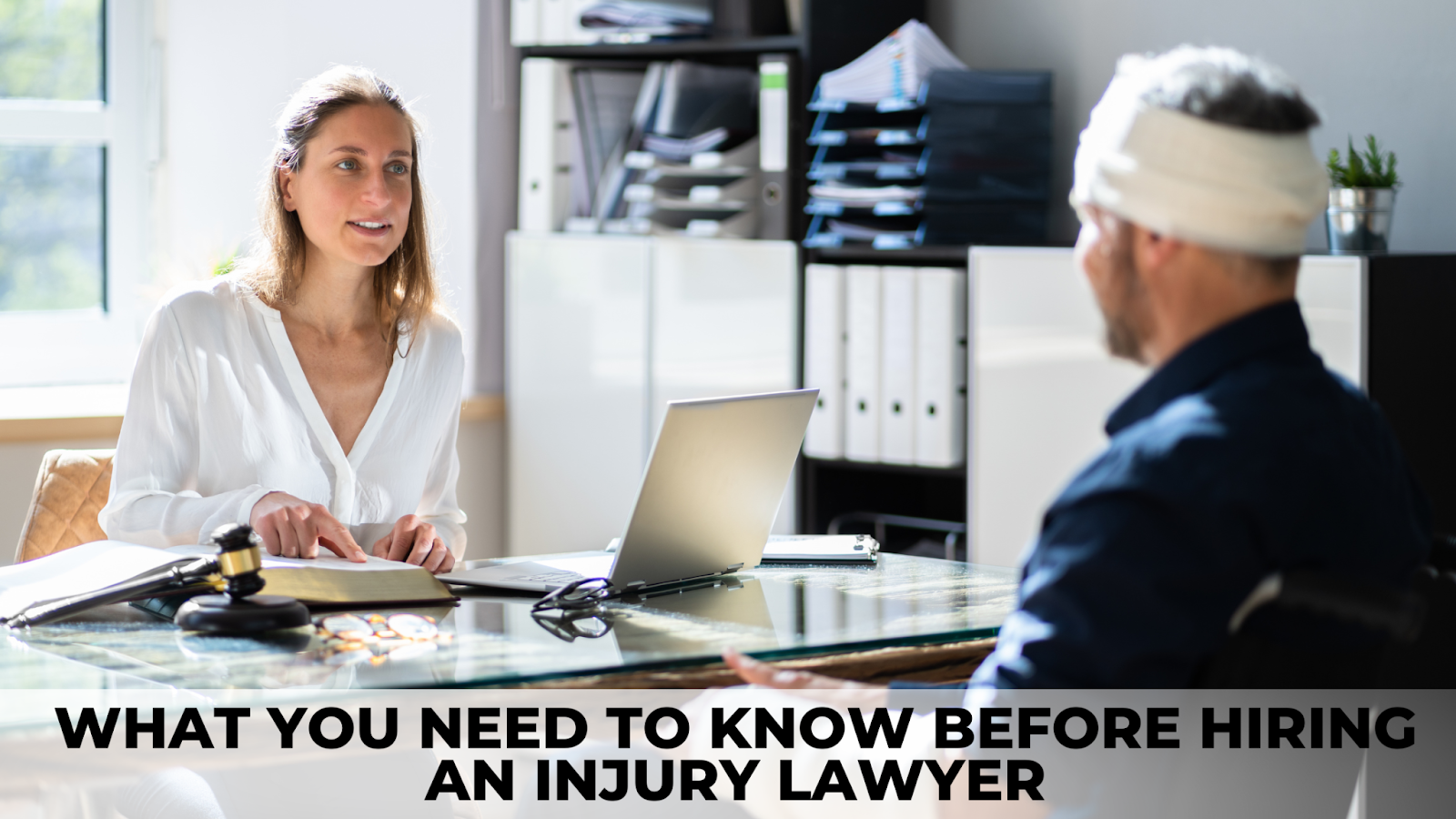When someone else has been negligent and you have suffered injuries as a result, getting good legal advice is imperative to how your case will proceed. However, the intense field of personal injury law can be daunting, especially in times of physical and emotional hurt.
This guide gives you important insight that is essential as you evaluate an injury attorney.
The Importance of Local Expertise in Personal Injury Cases
Local expertise is crucial in personal injury cases because a lawyer familiar with the area’s laws, courts, and legal processes can better navigate the complexities of your case. They understand local regulations, which can greatly impact settlement outcomes and negotiation strategies. Before hiring a personal injury lawyer, ensure they have a strong track record and deep knowledge of the local legal landscape to maximize your chances of success.
Every city has its legal landscape, making it crucial to find an attorney who understands local laws and court systems. In Louisiana, the “pure comparative fault” system allows you to recover damages even if you’re partially at fault for an accident.
When dealing with a car accident in Baton Rouge, hiring a local attorney ensures you navigate the area’s unique legal nuances effectively. Their familiarity with local insurance companies, judges, and accident hotspots strengthens your position.
This local expertise can improve your chances of securing fair compensation and avoiding unnecessary legal obstacles. A Baton Rouge car accident attorney brings valuable insight into local road conditions, traffic patterns, and court procedures, giving you a significant edge in your case.
Understanding the Importance of Specialization
Not all lawyers have the same expertise, and personal injury law is a highly specialized field. When seeking legal representation, prioritize attorneys who focus primarily on personal injury cases. These specialists possess:
- In-depth knowledge of personal injury laws and precedents
- Experience negotiating with insurance companies
- Familiarity with medical terminology and injury assessment
- Established relationships with expert witnesses
Hiring a generalist lawyer might save you money initially, but it could cost you significantly in the long run if they lack the specific expertise needed to handle your case effectively.
Evaluating Experience and Track Record
When it comes to personal injury law, experience matters. Look for attorneys with a proven track record of success in cases similar to yours. Consider the following factors:
- Years of practice: While not the only indicator of competence, longevity in the field often correlates with expertise.
- Case results: Ask about their success rate and the average settlement amounts they’ve secured for clients.
- Trial experience: Even though numerous cases are resolved out of court, you need a lawyer ready to take your case to trial if necessary.
Don’t hesitate to ask potential attorneys about their experience handling cases like yours. A confident and competent lawyer will be happy to discuss their qualifications and past successes.
Assessing Communication Skills and Availability
Any attorney-client partnership requires that effective communication be in place. During your initial consultation, pay attention to how the lawyer interacts with you:
- Do they explain legal concepts clearly?
- Do they tend to your questions and concerns?
- How quickly do they answer your inquiries?
Additionally, inquire about their communication policies:
- How often will they update you on your case?
- Will you be working directly with the lawyer, or rather mainly with paralegals?
- What’s their preferred method of communication (phone, email, in-person meetings)?
Remember, you are recruiting someone to champion your cause. You need a lawyer who will maintain your involvement and fill you in on the legal process.
Understanding Fee Structures
Nearly all personal injury legal professionals function on a contingency fee model, according to which they are compensated only if you win your lawsuit. Understanding that fee structures can be different, doing prior research on contract terms is essential. Ask about:
- The percentage the lawyer will take from your settlement
- Whether this percentage changes if the case goes to trial
- Any additional costs you might be responsible for (filing fees, expert witness fees, etc.)
Be cautious of lawyers who guarantee specific outcomes or promise unrealistically low fees. A reputable attorney will be upfront about their fee structure and the potential costs associated with your case.
Investigating Resources and Support Staff
Handling a personal injury case often requires significant resources. Inquire about the firm’s:
- Support staff (paralegals, investigators, etc.)
- Access to expert witnesses
- Financial capacity to see your case through to trial if necessary
A well-resourced firm can often build a stronger case and withstand the tactics of insurance companies trying to delay proceedings.
Checking Credentials and Disciplinary History
Before making your final decision, verify the lawyer’s credentials:
- Check their bar association status
- Look for any disciplinary actions or complaints
- Verify their membership in professional organizations
Most of this information is publicly available through state bar association websites.
Trusting Your Instincts
While credentials and experience are crucial, don’t underestimate the importance of personal rapport. You’ll be working closely with your attorney during a stressful time, so choose someone you feel comfortable with and trust.
Comparison Table: Solo Practitioner vs. Large Firm
| Aspect | Solo Practitioner | Large Firm |
| Personal Attention | High | Potentially lower |
| Resources | Limited | Extensive |
| Cost | Often lower | Potentially higher |
| Availability | May be more flexible | Structured availability |
| Case Load | Typically smaller | Often larger |
| Support Staff | Minimal | Comprehensive |
Questions to Ask Potential Injury Lawyers
During meetings with lawyers you might hire, ensure you come prepared with your questions. Here’s a list to get you started:
- How many situations like mine have you taken care of?
- What share of your practice is focused on personal injury law?
- Will you be taking care of my case yourself, or will an associate deal with it?
- Can I obtain references from past clients?
- What method do you use for talking about settlement negotiations?
- Are you set to defend my case if it turns out to be necessary?
- In your opinion, for how long might you expect your case to last?
- What concerns do you anticipate with regard to my case?
Red Flags to Watch Out For
As you evaluate potential lawyers, be alert for these warning signs:
- Guaranteed outcomes: No ethical lawyer can promise a specific result.
- Pressure to sign immediately: You should have time to consider your options.
- Lack of transparency about fees: All costs should be clearly explained upfront.
- Poor reviews or disciplinary actions: Check online reviews and bar association records.
- Lack of clear communication: If they’re hard to reach now, it won’t improve later.
The Importance of Local Knowledge
While not always necessary, hiring a lawyer familiar with local courts and judges can be advantageous. They may have insights into:
- Local jury tendencies
- Judges’ preferences and tendencies
- Relationships with local experts and court personnel
This local knowledge can sometimes give your case an edge, especially in smaller jurisdictions.
Understanding the Timeline
Cases related to personal injury tend to run for months and sometimes years. An excellent lawyer will provide a genuine timeline and will keep you updated on any developments. Be wary of attorneys who promise quick resolutions, as this might indicate a tendency to settle for less than your case is worth.
The Role of Technology in Modern Law Practices
In today’s digital age, technology plays a crucial role in legal practice. Ask potential lawyers about case management software.
- E-discovery tools
- Virtual meeting options
- Secure client portals for document sharing
A tech-savvy law firm can often handle your case more efficiently and keep you better informed throughout the process.
Conclusion
Making the right decision about your injury lawyer can significantly alter the result of your case. Recognizing what to study and what inquiries demand responses leads you to favor a solution that gives you the greatest chance for a favorable outcome. Understand that an incredible lawyer is highly knowledgeable about the law. Apart from that take on roles as advocate, counselor, and dedicated supporter of your quest for justice their use of:
FAQs
How long do I have to file a personal injury lawsuit?
The statute of limitations varies by state and type of injury. In some states, you may have as little as one year, while others allow up to six years. It’s crucial to consult with a lawyer as soon as possible to ensure you don’t miss important deadlines.
What if I can’t afford to pay a lawyer upfront?
Most personal injury lawyers work on a contingency fee basis, meaning they only get paid if you win your case. This allows injured individuals to access legal representation without upfront costs. However, you may still be responsible for certain expenses, so discuss the fee structure thoroughly with any potential attorney.
How much is my injury case worth?
The value of a personal injury case depends on numerous factors, including the severity of your injuries, long-term impact on your life, medical expenses, lost wages, and more. An experienced injury lawyer can provide a more accurate estimate after reviewing the details of your case. Be wary of attorneys who promise specific dollar amounts without thoroughly examining your situation.



